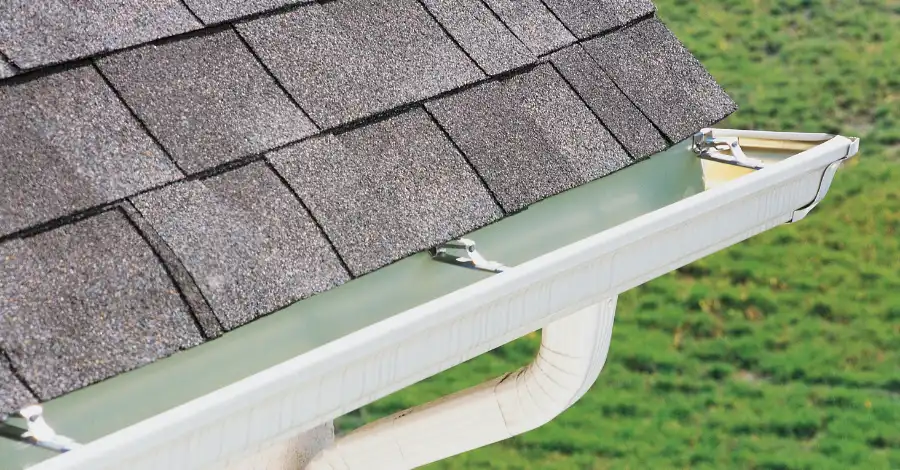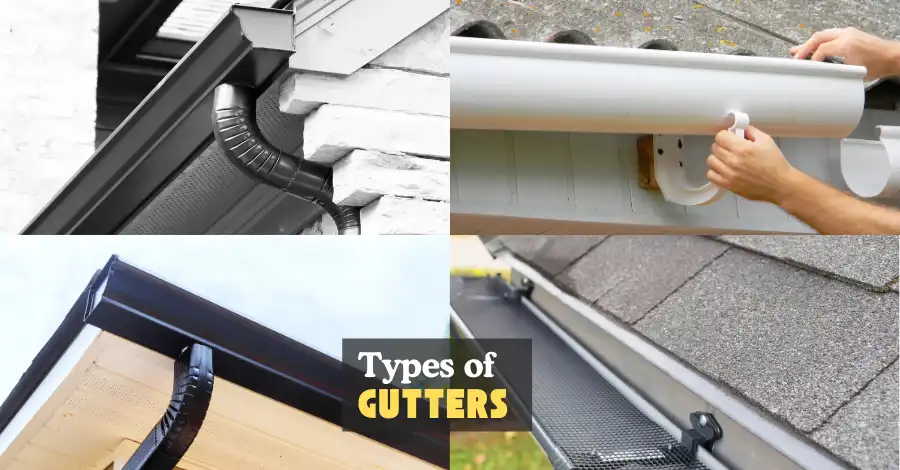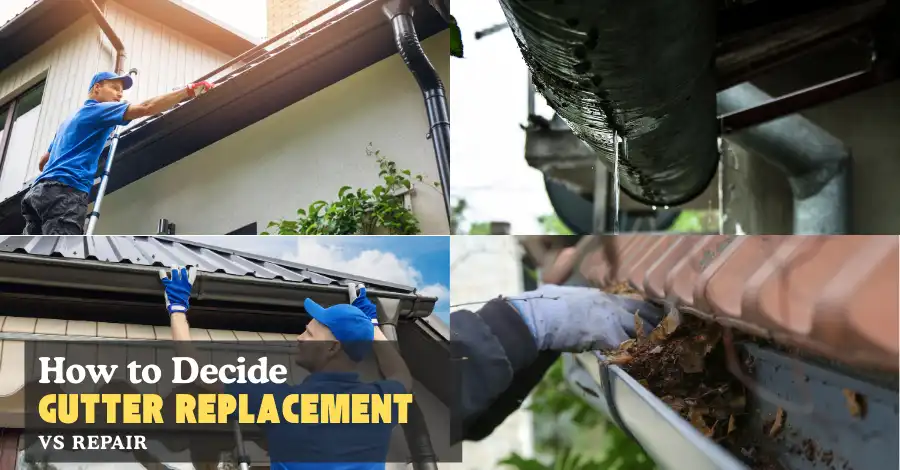Gutters play a vital role in safeguarding your house from damage caused by water. They divert water away from the foundation as well as the landscaping and siding. But, over time the gutters can become blocked, damaged or worn out which leaves homeowners with a difficult choice to make: do you make repairs to the gutters you already have installed or should you completely go for gutter replacement?
This entire guide will help you taking a look at the pros and cons in addition to the price, so that you can choose the best option for your home and budget in 2025.
What Are Gutters and Why Are They Important?
Gutters are a small channel that is attached to the edges the roof. They’re specifically designed to catch rainwater and divert it away from your home.

- Be sure to avoid foundations from being damaged and basements from flooding.
- Secure windows, doors, and siding from water damage.
- Help reduce soil erosion and safeguard landscaping.
- Stop the development of mildew mold, and stop the spread of mildew, rot, and mold.
Example:
A house that isn’t equipped with gutters, or has gutters that are damaged, may be prone to the accumulation of water around the foundation, which can cause cracks, leaks, or even structural issues in the future.
Types of Gutters

1. K Style Gutters
- Most common in modern homes.
- Flat front and back, with a decorative front.
- Strong and powerful capacity for water.
- It is available in range of materials.
2. Half Round Gutters
- Traditional, round shape.
- Common in old or historic houses.
- Cleaner, but less capacity.
- Most of the time it is composed of copper or aluminum.
3. Box Gutters
- A roof is incorporated in the structural.
- Used in commercial structures and also in certain historical homes.
- Can handle large volumes of water.
4. Straight or Sectional Gutters
- Straight: A custom designed solution for homes that has less leaks, however it is more expensive which requires a professional to install.
- Sectional: It is composed of parts More joint joints (potential leaks) Simple DIY and cost effective.
5. Gutter Materials
| Material | Pros | Cons | Average Lifespan |
| Aluminum | The light, rust proof material is reasonably priced. | Can dent | 20-30 Years |
| Vinyl | Cheap, simple DIY | Can crack, fade, less durable | 10- 20 years |
| Steel | Strong, perfect for snow that is heavy. | Can rust, heavy | 15-25 years old |
| Copper | Beautiful, long lasting | Expensive, needs pro install | 50or more |
| Zinc | High quality and durable with low upkeep | Access is limited, costly | 40-50 Years |
Example:
A house constructed in the past could have copper gutters with half round shapes to guarantee authenticity, while modern homes could choose seamless aluminum to reduce costs and increase efficiency.
Cost of Gutter Repair by Type
| Gutter Type | the Average Repair Cost (per 10′) |
| Aluminum | $60 – $120 |
| Vinyl | $40 – $80 |
| Steel | $80 – $150 |
| Copper | $120 – $250 |
| Seamless | $100 – $200 |
Common Repairs:
- Attaching the gutters to its loose ends.
- Repairing leaks or holes.
- Replacing damaged sections.
- Fixing hangers and downspouts.
Example:
A small leak in a gutter made of vinyl can cost up to $50 to fix, while fixing damaged components of copper gutters could cost you more 200 dollars.
Cost of Gutter Replacement by Type
| Gutter Type | Average Gutter Replacement Cost (per linear foot, installed) |
| Aluminum | $6 – $14 |
| Vinyl | $4 – $8 |
| Steel | $8 – $18 |
| Copper | $20 – $40 |
| Zinc | $18 – $30 |
| Seamless | $8 – $20 |
A completely replacement home that are typical in size (150-200 linear feet):
- Vinyl: $600 – $1,600
- Aluminum: $900 – $2,800
- Steel: $1,200 – $3,600
- Copper: $3,000 – $8,000+
Cost of Gutter Replacement/Repair by Home Size
| Home Size | Repair (per job) | Replacer (full System) |
| Apartment/Condo | $100 – $300 | $600 – $1,500 |
| Small Home | $150 – $400 | $1,000 – $2,500 |
| Medium Home | $200 – $600 | $1,500 – $3,500 |
| Large Home | $300 – $900 | $2,500 – $6,000+ |
The bigger homes and multi story structures cost more because of the need for greater construction materials as well with workers.
Factors Influencing the Decision: Gutter Replacement?
- Modification of Gutters: Gutters older than 20 years may be a better option for replacement.
- Amount of the Damage: Small leaks or broken sections are fixable. But, large scale rust, sagging, or multiple leaks could require replacement.
- Material: A few material (like vinyl) are less expensive for replacement than fix.
- Visuals: New gutters can improve the curb appeal of your property.
- Budget Repairs: Cost are lower in the short term, but repairs can be more cost-effective over the long term.
- Water Damage: If gutters have damaged the siding or the fascia, replacement may be needed.
- Maintenance: Regular maintenance may indicate that it’s time for a new installation of gutters.
- Climate: Zones that experience frequent rain or snowfall may require more sturdy gutters.
Example:
If your gutters seem to be falling in a variety of areas and are covered in corrosion spots replacing them is the best option. If you just have one damaged section it is possible to repair them.
Pros and Cons of Gutter Repair
Pros
- Costs of purchase at the beginning lower.
- Quick solution for minor problems.
- Home is quieter.
- Conserves existing materials.
- Perfect for older homes, or when they complement the gutters that are in place.
Cons
- This isn’t always the best solution to the root of the issue.
- Shorter term solution.
- Fixes which are often made can build up.
- Might not enhance appearance.
- It might not be possible if gutters are damaged beyond repair or are old.
Example:
Repairing leaks that are smaller or reattaching loose pieces is cost effective. In the event that you’re required to repair your leak each season, replacing the entire structure is more affordable.
Pros and Cons of Gutter Replacement
Pros
- Enhances the water flow and safeguard.
- A more attractive curb appeal can raise the value of a house.
- The new warranties are backed by a greater life time.
- Possibility of updating the materials and styles.
- There are fewer leaks, and less maintenance issues.
- You can also add gutter guards, or any other enhancements.
Cons
- Costs of initial costs that are greater.
- More disruptive installation.
- Could be required to obtain HOA approval and/or permits.
- It is not always needed However, it’s necessary to solve minor issues.
Example:
The removal of the segmental gutters to be replaced with seamless aluminum is a fantastic option to stop water leaks and to reduce maintenance while also improving the appearance of your house.
Step by Step Guide: How to Decide Gutter Replacement vs Repair

Step 1: Inspect Your Gutters
- Find signs of leaks, rust, cracks that are sagging or peeled paint.
- Check for evidence of water damage on the siding or fascia.
Step 2: Assess the Age and Material
- Gutters that have been in use for more than 20 years old or constructed out of vinyl may need required to be changed.
Step 3: Evaluate the Extent of Damage
- The leaks are isolated, and the loose areas are fixable.
- Numerous leaks rusts or sagging may require replacement.
Step 4: Consider Your Budget
- Repairs are more affordable in the short run and replacing them can help you save money over the long term.
Step 5: Think About Curb Appeal
- The installation of new gutters can change the appearance of your house.
Step 6: Get Professional Advice
- Allow a gutter expert examine and make suggestions.
Step 7: Compare Costs
- Request quotations to repair or replace.
Step 8: Make Your Decision
- Select the option between gutter replacement and repair, which is the most appropriate for your needs, budget and longer term objectives.
Common Mistakes to Avoid Gutter Replacement or Repair
- Small leaks can cause major damage.
- Poor repairs can cause more harm.
- Low quality gutters or repairs could cost more over long run.
- Clogged gutters cause the most problems.
- Downspouts are as vital like gutters.
- Always inspect fascia as well as siding as well as foundation.
- Guards can reduce maintenance and also help to keep obstructions out.
- Improperly sloped gutters do not drain properly.
Gutter Maintenance Tips for Longevity
- Cleansing gutters at minimum twice a year (spring and fall).
- Install gutter guards to prevent the build up of debris.
- Find water leaks, or areas that are loose following each major storm.
- Remove branches near to the roof to prevent leaves and branches from blocking your drains.
- Make sure to check for downspouts to make sure that the water drains away from the foundation of your home.
- Re seal joints and seams at any time.
- Repaint or paint gutters constructed of metal to stop the growth of the rust.
Example:
A homeowner that maintains their gutters during the autumn and spring and examines the gutters for leaks after storms can prolong the life of their gutters by 5-10 years.
Environmental Impact: Old Gutters and Sustainable Choices
1. Recycling Old Gutters:
- Gutter made from aluminum and steel are recycled at most scrap yards.
- Vinyl isn’t frequently reused, however it’s sometimes used again.
- Copper gutters are very beneficial to reuse.
2. Eco Friendly Gutter Materials:
- Choose recycled aluminum or steel for gutters that are brand new.
- Consider the rainwater collection systems which use runoff.
- Utilize gutter guards in order to limit the use of chemical cleaners.
3. Disposal Tips:
- Do not throw old gutters in landfill If recycling is feasible.
- Your technician should be informed about eco friendly disposal options.
Conclusion
The decision between gutter replacement or repair is a crucial decision that homeowners from all different ages. When you know all the benefits and drawbacks, and costs of each option, you will be able to choose the best option to safeguard your home’s look and worth. If you choose to repair or replace your gutters regular maintenance and timely actions will keep your gutters, and your house, protected against water related damage the years to come.
Pro Tip:
Schedule gutter checks in the in the spring and autumn, as well as after major storms to identify issues before they get grave.
FAQs
How do I know if my gutters need repairs or replacement?
Examine your gutters for leaks, rust, or sagging. Minor problems can often be repaired, but widespread or serious damage may require full replacement.
How long do gutters typically last?
The typical lifespan of gutters is between 20 and 30 years, depending on the materials used and how well they are maintained.
Can I repair gutters myself?
Small leaks or loose parts can often be fixed by a handy homeowner. However, major repairs or full gutter replacement should be handled by professionals.
Are seamless gutters better than sectional gutters?
Yes, seamless gutters have fewer joints, which means less chance of leaks and lower maintenance needs.
How often should I clean my gutters?
At a minimum, clean your gutters twice a year more often if you have overhanging trees nearby.
Will new gutters add value to my home?
Yes. New gutters can enhance your home’s curb appeal and protect it from water damage, which adds value.
Are there incentives for replacing gutters?
Some local programs offer incentives for gutter replacement or stormwater management. Check with your city or county for details.
What is the best material for gutters?
Aluminum is popular for its affordability and durability. Copper is also highly durable and long-lasting, though more expensive.
Can clogged gutters cause ceiling leaks?
Yes. Blocked gutters can cause water to back up, leading to leaks and potential rot in your roof or ceiling.
Should I replace downspouts when replacing gutters?
Yes, it’s a good idea to replace both gutters and downspouts at the same time for optimal performance.
